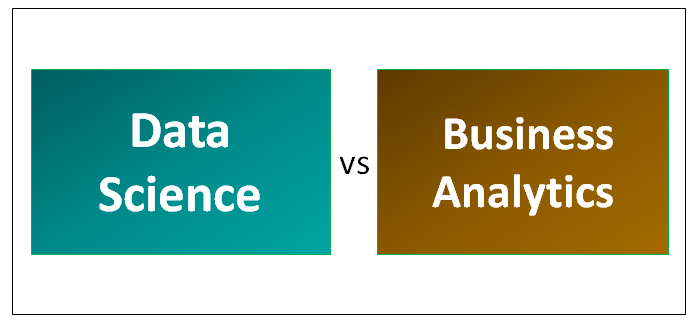I must admit that I struggled to choose the right courses for my MS in Business Analytics program. Two items, in particular, were confusing: What would I learn about? And what careers will be open to me? It became crucial to understand the differences between data science vs business analytics, two related degrees.
Source and Definition
Let’s start by talking about each domain separately. Jeff Hammerbacher and Dr. Patil first used the phrase “Data Scientist” in 2008. A data scientist is a person who studies the field and applies it to challenges in the real world. It is an interdisciplinary field that incorporates statistics, data analysis, data visualization, scientific methods, artificial intelligence, machine learning, and even the highly sought-after deep learning. The range of tasks that data scientists are capable of performing includes gathering and collecting data from various data sources, including the web, media data, such as images and videos, sensor data, and cellular-client data, preprocessing the data (cleaning, aggregating, and normalizing) into a common general form, and applying specific algorithms to maximize data-driven insights.
Requirements for Business Analysts
Want to learn the steps for becoming a business analyst? Getting the requisite education, such as a bachelor’s degree in business, finance, or a similar topic, is the first step in starting a career as a business analyst. A master’s degree in business administration or business analytics may be necessary for some employers to hire business analysts. Employers may include extra business analyst criteria, such as experience or knowledge with particular software and applications, in their job descriptions, depending on the role.
You can learn these abilities and others by pursuing a thorough business analyst education with a master’s degree. With Syracuse University’s master’s in business analytics online, you learn foundational data skills and the methods for applying them in a business setting to help position your organization for success.
Requirements for Data Scientists
Most data scientists complete an undergraduate degree and a master’s degree before entering the field, a process that typically takes six to seven years. While some employers only require a bachelor’s degree, others prefer a master’s or doctoral degree. A 2017 IBM study [PDF, 3.9MB] confirms this. External link:open_in_new found that 39 percent of data science job postings listed a master’s degree or Ph.D. among their data scientist requirements. Nevertheless, there is no complete manual on how to become a data scientist. If you learn the technical skills to analyze and communicate data, you might be able to get your foot in the door without a formal degree—as long as you have projects and experience to prove your potential.
Business Analyst vs Data Scientist – Job Role
It is crucial to comprehend the issues or tasks that business analysts and data scientists work on in order to distinguish between them. Let us take up an interesting example. Imagine that you are a manager of a bank and you decide to implement two important projects. You have a team of a data scientist and a business analyst. How will you do the project mapping job? Below are two problem statements:
Build a model to predict which transaction is Fraudulent
Take your time to understand the problems. What do you think, which problem is best suited for which profile?
The first problem statement requires making several business assumptions and incorporating macro changes into the strategy. This will require more business expertise and decision-making, this will be the job of a business analyst.
What Is Data Science?
Data science is an interdisciplinary field that involves the extraction and analysis of raw data to deliver structured data. Data Scientists, like Business Analysts, are involved in extracting, formatting, analyzing, and maintaining big data sets. They typically work more on the front end of the data collection and analysis process.
Since their responsibilities also include designing, developing, and deploying algorithms to collect and analyze data, they tend to develop more technical skills in these areas.
While both data science and business analysis rely on coding knowledge and data manipulation, data science includes the more specialized fields of big data, machine learning, and artificial intelligence.
What Is Business Analytics?
Business analysis is the practice of analyzing, organizing, and enabling change in an enterprise by identifying needs and recommending solutions that deliver value to stakeholders.
A Business Analyst is an “agent of change” who is involved in defining a roadmap related to new opportunities. They analyze the data and develop actionable plans. They are also tasked with finding discrepancies within different business models, helping decision-makers to understand a company’s performance in the past and present, and forecasting future performance.
FAQ
1. Which is better data science or Business Analytics?
Business analytics is mostly focused on helping companies make business decisions. It involves gathering data, analyzing it, and finding patterns that can be used to predict future outcomes. Data science is also a broader field than business analytics because it involves more than just predicting future events.
2. Which pays more for data science or Business Analytics?
Data Scientists have more education and a higher degree of specialization, and so they typically command a higher salary than Business Analysts.
3. Which field is better than data science?
While data science includes statistics and machine learning, software engineering focuses more on coding languages. Both professions are in great demand and highly rewarding.
4. Why data science is better than MBA?
Technical skills: The main difference between MBA in Analytics and Data Science and other domains is that the other domains are solely focused on managerial aspects. But data science clubs have technical skills and managerial skills. A person will learn technical skills like SQL, Python, and data visualization.

